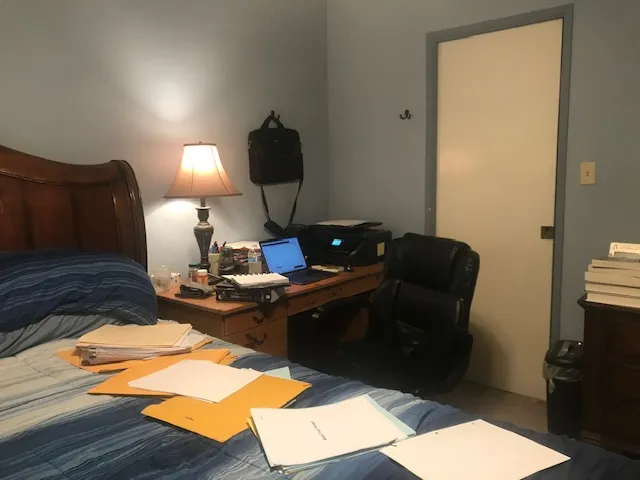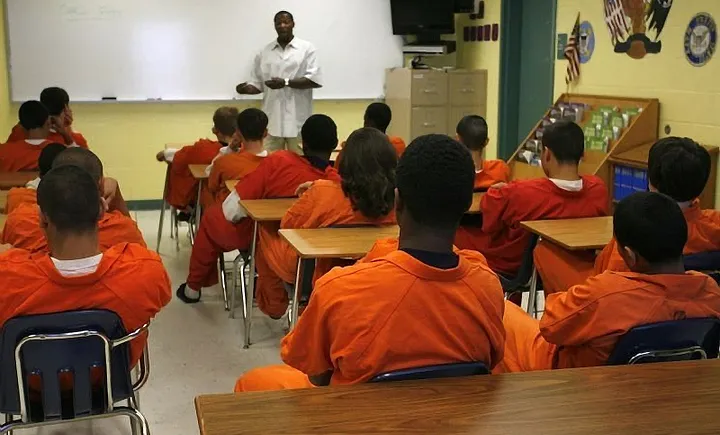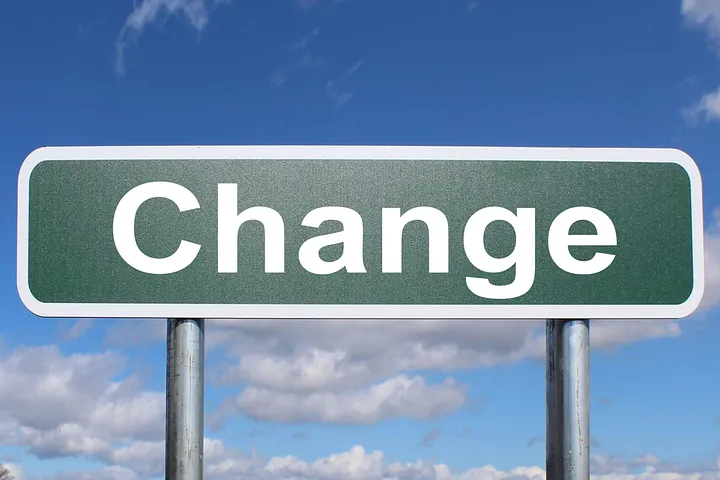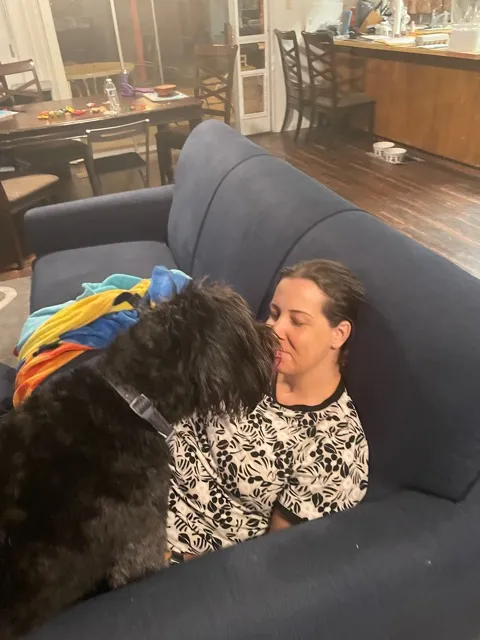When Prison Teaching Breaks You: A Professor’s Journey Through Burnout
Teaching Inside the Rising Scholar’s Program (Prison Education)

My entire Tik-Tok feed is discussing work burn out right now and since I just experienced it (and that is probably why it keeps coming up in my feed), I wanted to talk about it. I took a semester off, but it might have come a bit too late in my burn out. Going back inside brought it all back and then I was really struggling mentally for most of the semester. Everyone thinks that burnout in the prisons is a physical and personal safety issue, but it was not about that. I just lost my ability to compartmentalize and to know deep down that their success or failure in understanding my lectures or directions was not my fault. Some of it may be, but I was taking it all on, and there are a lot of reasons that made them less successful than they thought they should be. They were also not doing as badly as they thought they were, but I was personalizing it and having a tough time letting it go at home. All of the students thought they should be getting an A (this was the first big obstacle), so when they received feedback, I had initial and loud resistance. We also only met once a week. A writing course is definitely more manageable with more face time, but it is not worth it for so many reasons to go in for one class multiple times a week. In addition, we had lockdowns, so one of my classes missed a lot, and we had to just keep rolling. They were frustrated and so was I. I have been teaching in the program since 2019, and every year there was something that made the work harder. Some of the disasters included: a global pandemic, flooding around one of the prisons, and a prison closure mid-semester. This does not include regular obstacles like students not having paper or pencils, access to the internet, or transfers. It was always something. Students on the main campus also have obstacles to being successful, but there is not as much pressure. When I am not in the middle of burnout, I have a much easier time letting it go and realizing that the students are mad at themselves for not doing their work, and they are trying to make it my problem, so I do not let them. My ability to do that was completely gone this semester.
I also encountered some problems that were just now popping up. I have some sensory issues that have become harder to deal with. It is very loud in the prison. I cannot understand when one student is talking to me if anyone else around me is talking, which is very frustrating. I have been tested, and I do not have any hearing deficits, but I cannot hear them when there are too many voices at once. I was also getting dizzy spells and headaches while I was inside. I have had dizzy spells and headaches for most of my life, but I had not had an episode for a few years due to some medication, but it was happening a lot again. The stress from navigating through these obstacles was taking a toll.
English professors are being asked to do something that feels impossible sometimes. We are supposed to take all students no matter what level they start with and make them into passable academic writers in one semester. On campus, I have extra support to help make that happen. A lot of our students fail in that first semester, and it takes two or three before they reach the level they need to pass that class. In prison, if a student does not pass the course the first time, they might be waiting years to take the class when it comes back again or they might not get back into it the next time because there are too many students who need that class.
This work is good and beneficial. Most of the students really appreciate your time and effort. It significantly reduces recidivism for students who take college courses. I believe in this work, but it is also hard. I have done some research on work burnout and the only solution is to take a break from it until you feel better, which is on its own timeline. There are some initiatives within the program to require that instructors take scheduled and frequent breaks from teaching inside. It looks like a great idea. When I was first informed about this potential requirement, I was dismissive because I loved my work and was having no trouble at the time with working inside (the obstacles were still there, but I bounced back pretty quickly). After awhile, it wears on you. Frequent and scheduled breaks may not completely fix the work burn out problem, but it will help.
Teaching Inside the Rising Scholar’s Program (Prison Education)

My entire Tik-Tok feed is discussing work burn out right now and since I just experienced it (and that is probably why it keeps coming up in my feed), I wanted to talk about it. I took a semester off, but it might have come a bit too late in my burn out. Going back inside brought it all back and then I was really struggling mentally for most of the semester. Everyone thinks that burnout in the prisons is a physical and personal safety issue, but it was not about that. I just lost my ability to compartmentalize and to know deep down that their success or failure in understanding my lectures or directions was not my fault. Some of it may be, but I was taking it all on, and there are a lot of reasons that made them less successful than they thought they should be. They were also not doing as badly as they thought they were, but I was personalizing it and having a tough time letting it go at home. All of the students thought they should be getting an A (this was the first big obstacle), so when they received feedback, I had initial and loud resistance. We also only met once a week. A writing course is definitely more manageable with more face time, but it is not worth it for so many reasons to go in for one class multiple times a week. In addition, we had lockdowns, so one of my classes missed a lot, and we had to just keep rolling. They were frustrated and so was I. I have been teaching in the program since 2019, and every year there was something that made the work harder. Some of the disasters included: a global pandemic, flooding around one of the prisons, and a prison closure mid-semester. This does not include regular obstacles like students not having paper or pencils, access to the internet, or transfers. It was always something. Students on the main campus also have obstacles to being successful, but there is not as much pressure. When I am not in the middle of burnout, I have a much easier time letting it go and realizing that the students are mad at themselves for not doing their work, and they are trying to make it my problem, so I do not let them. My ability to do that was completely gone this semester.
I also encountered some problems that were just now popping up. I have some sensory issues that have become harder to deal with. It is very loud in the prison. I cannot understand when one student is talking to me if anyone else around me is talking, which is very frustrating. I have been tested, and I do not have any hearing deficits, but I cannot hear them when there are too many voices at once. I was also getting dizzy spells and headaches while I was inside. I have had dizzy spells and headaches for most of my life, but I had not had an episode for a few years due to some medication, but it was happening a lot again. The stress from navigating through these obstacles was taking a toll.
English professors are being asked to do something that feels impossible sometimes. We are supposed to take all students no matter what level they start with and make them into passable academic writers in one semester. On campus, I have extra support to help make that happen. A lot of our students fail in that first semester, and it takes two or three before they reach the level they need to pass that class. In prison, if a student does not pass the course the first time, they might be waiting years to take the class when it comes back again or they might not get back into it the next time because there are too many students who need that class.
This work is good and beneficial. Most of the students really appreciate your time and effort. It significantly reduces recidivism for students who take college courses. I believe in this work, but it is also hard. I have done some research on work burnout and the only solution is to take a break from it until you feel better, which is on its own timeline. There are some initiatives within the program to require that instructors take scheduled and frequent breaks from teaching inside. It looks like a great idea. When I was first informed about this potential requirement, I was dismissive because I loved my work and was having no trouble at the time with working inside (the obstacles were still there, but I bounced back pretty quickly). After awhile, it wears on you. Frequent and scheduled breaks may not completely fix the work burn out problem, but it will help.
Teaching Inside the Rising Scholar’s Program (Prison Education)

My entire Tik-Tok feed is discussing work burn out right now and since I just experienced it (and that is probably why it keeps coming up in my feed), I wanted to talk about it. I took a semester off, but it might have come a bit too late in my burn out. Going back inside brought it all back and then I was really struggling mentally for most of the semester. Everyone thinks that burnout in the prisons is a physical and personal safety issue, but it was not about that. I just lost my ability to compartmentalize and to know deep down that their success or failure in understanding my lectures or directions was not my fault. Some of it may be, but I was taking it all on, and there are a lot of reasons that made them less successful than they thought they should be. They were also not doing as badly as they thought they were, but I was personalizing it and having a tough time letting it go at home. All of the students thought they should be getting an A (this was the first big obstacle), so when they received feedback, I had initial and loud resistance. We also only met once a week. A writing course is definitely more manageable with more face time, but it is not worth it for so many reasons to go in for one class multiple times a week. In addition, we had lockdowns, so one of my classes missed a lot, and we had to just keep rolling. They were frustrated and so was I. I have been teaching in the program since 2019, and every year there was something that made the work harder. Some of the disasters included: a global pandemic, flooding around one of the prisons, and a prison closure mid-semester. This does not include regular obstacles like students not having paper or pencils, access to the internet, or transfers. It was always something. Students on the main campus also have obstacles to being successful, but there is not as much pressure. When I am not in the middle of burnout, I have a much easier time letting it go and realizing that the students are mad at themselves for not doing their work, and they are trying to make it my problem, so I do not let them. My ability to do that was completely gone this semester.
I also encountered some problems that were just now popping up. I have some sensory issues that have become harder to deal with. It is very loud in the prison. I cannot understand when one student is talking to me if anyone else around me is talking, which is very frustrating. I have been tested, and I do not have any hearing deficits, but I cannot hear them when there are too many voices at once. I was also getting dizzy spells and headaches while I was inside. I have had dizzy spells and headaches for most of my life, but I had not had an episode for a few years due to some medication, but it was happening a lot again. The stress from navigating through these obstacles was taking a toll.
English professors are being asked to do something that feels impossible sometimes. We are supposed to take all students no matter what level they start with and make them into passable academic writers in one semester. On campus, I have extra support to help make that happen. A lot of our students fail in that first semester, and it takes two or three before they reach the level they need to pass that class. In prison, if a student does not pass the course the first time, they might be waiting years to take the class when it comes back again or they might not get back into it the next time because there are too many students who need that class.
This work is good and beneficial. Most of the students really appreciate your time and effort. It significantly reduces recidivism for students who take college courses. I believe in this work, but it is also hard. I have done some research on work burnout and the only solution is to take a break from it until you feel better, which is on its own timeline. There are some initiatives within the program to require that instructors take scheduled and frequent breaks from teaching inside. It looks like a great idea. When I was first informed about this potential requirement, I was dismissive because I loved my work and was having no trouble at the time with working inside (the obstacles were still there, but I bounced back pretty quickly). After awhile, it wears on you. Frequent and scheduled breaks may not completely fix the work burn out problem, but it will help.






